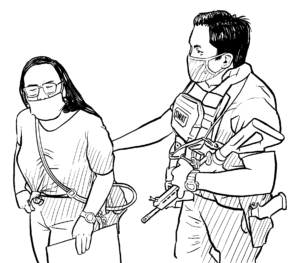Under the state's watchful eye

The SIM Card Registration Act now only awaits Rodrigo Duterte’s signature to become a full law. The proposed law mandates that all cellular phone users and subscribers of any type of telecommunications must register their full names and present their ID before purchasing SIM cards. The law also covers current and new users of social media.
This law forms part of strengthening the state’s machinery for surveillance against the people. The Duterte government railroaded its ratification in January after languishing in Congress for several years since 2016. The law purports that it will solve cybercrimes and terrorism.
If enacted, the law will outrightly attack the right to privacy of the estimated 82 Filipino cellphone users, including around 73 million social media users of Facebook, Twitter, Instagram and others. In addition, the state intends to keep the personal information of all cellphone users for 10 years. The law is also deliberately ambiguous as to which individuals and government agencies are allowed access to these data and how these will be used.
Under this law, every cellphone text message or each post on Facebook or Twitter will become directly connected to a specific person. Anyone who communicates through cellphone loses their privacy and anonymity.
This law gradually erodes the people’s right to their private lives, which is key to a democracy. This basic right guarantees that a person determines and decides upon the boundaries of the different aspects of their lives. These include their correspondences, location, and even views on politics, religion, sexuality and others.
No less than the reactionary 1987 constitution stipulates the sanctity of private correspondence, information shared between a lawyer and their client, medical information between a doctor and their patient, business transactions and even between a journalist and his or her source. These are “privileged information” that only the individuals involved should be privy of and are exempt from state interference and surveillance. Any attempt to scrutinize these without any legal basis or court order is an abuse of power.
In the face of severe repression, anyone who makes a firm stand risk exposing their real identity. A cloud of fear will permanently hinder people’s rights to freely express their views and engage in public debate. A tyrannical state, moreso, will possess the superfluous capacity to monitor ordinary people and journalists beyond any legitimate government interests.
In particular, this will result in decreased reports of government corruption, police and military atrocities, violations of human rights and international humanitarian law, corporate abuses, environmental destruction and other wrongdoings and crimes by powerful entities. Without anonymity, the people and those in the media will be hindered by fears of persecution and abuse from military and police officers, big bureaucrats, government officials and big corporations, and powerful religious authorities.
Advocates of internet security also assert that there will be greater disadvantages with the enactment of the SIM card registration. They denounced the power given to the state to subpoena telecommunications companies to surrender information of subscribers or users of their services. Prior this law, the government and telecommunications companies have already been collecting personal in-formation such as names, addresses and dates of birth. They also gather information from valid IDs and selfies required for availing their financial services.
In many parts of the world, the SIM card registration has long been proven ineffective in solving related crimes. On the contrary, such laws have resulted into increased and worse forms of crimes such as identity theft and the illegal trade of SIM cards. The only remaining reason to insist on this law is for the fascist state to keep watch on its people round the clock.
(Read the longer version of this article on cpp.ph.)



